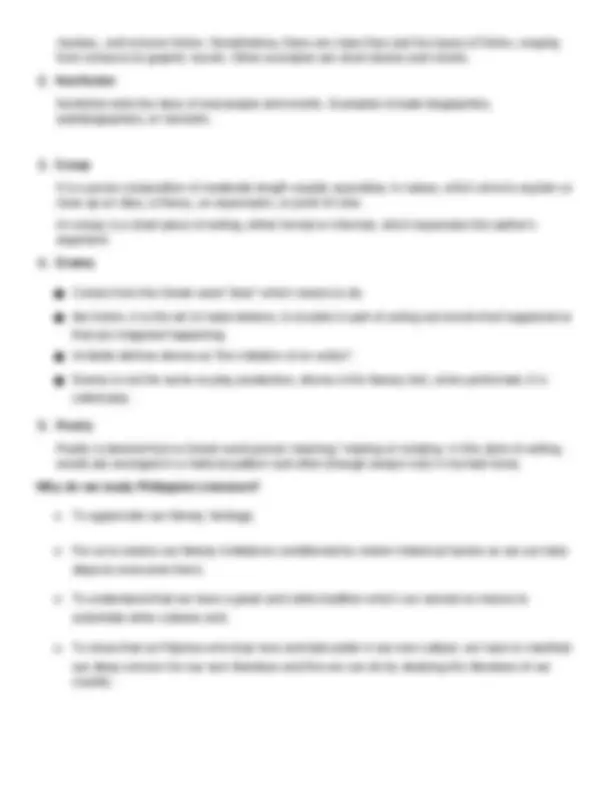



Study with the several resources on Docsity

Earn points by helping other students or get them with a premium plan


Prepare for your exams
Study with the several resources on Docsity

Earn points to download
Earn points by helping other students or get them with a premium plan
Community
Ask the community for help and clear up your study doubts
Discover the best universities in your country according to Docsity users
Free resources
Download our free guides on studying techniques, anxiety management strategies, and thesis advice from Docsity tutors
This document delves into the relationship between literature and history, discussing how literature is a part of history yet distinct in its ability to convey imagination and emotion. It also covers the essence and significance of literature, the five main genres, and why studying philippine literature is important.
What you will learn
Typology: Summaries
1 / 2

This page cannot be seen from the preview
Don't miss anything!


Introduction to Literature What could be the difference between literature and history? Literature and history are closely interrelated. In discovering the history of a race, the feelings, aspirations, customs and traditions of a people are sure to be included and these feelings, aspirations, customs and traditions that are written is literature. History can also be written and this too, is literature. Events that can be written down are part of true literature. Literature, therefore, is part of history. Literature and history, however, also have differences. Literature may be pigments of the imagination or events devoid of truth that have been written down, while history is made up of events that really happened. Essence and Significance of Literature ● Literature (origin of term- litera which means letter) deals with ideas, thoughts and emotions of man- thus it can be said the literature is the story of man. Literature comes from the French phrase “belles-letter” which means beautiful writing. ● Literature in its broadest sense, is everything that has ever been written. ● The best way to understand human nature fully and to know a nation completely is to study literature. ● Through literature, we learn the innermost feelings and thoughts of people- the most real part of themselves, thus we gain an understanding not only of others, but more importantly, of ourselves and of life itself. ● Literature is a faithful production of life in a sense it is a product and a commentary on life process. ● Literature offers us an experience in which we should participate as we read and test what we read by our own experience. ● Literature is our life’s story including its struggles, ideas, failures, sacrifices and happiness. ● Literature appeals to a man’s higher nature and its needs- emotional, spiritual, intellectual, and creative. Like all the other forms of art, literature entertains and gives pleasure; it fires the imagination and arouses noble emotions and it enriches man by enabling him to reflect on life and by filling him with new ideas. The Five Main Genres of Literature
1. Fiction It is one of the most popular genres of literature which features imaginary characters and events. This genre is often broken up into five subgenres: fantasy, historical fiction, contemporary fiction,
mystery, and science fiction. Nonetheless, there are more than just five types of fiction, ranging from romance to graphic novels. Other examples are short stories and novels.
2. Nonfiction Nonfiction tells the story of real people and events. Examples include biographies, autobiographies, or memoirs. 3. Essay It is a prose composition of moderate length usually expository in nature, which aims to explain or clear up an idea, a theory, an expression, or point of view. An essay is a short piece of writing, either formal or informal, which expresses the author’s argument. 4. Drama ● Comes from the Greek word “dran” which means to do. ● like fiction, it is the art of make-believe, it consists in part of acting out events that happened or that are imagined happening. ● Aristotle defines drama as “the imitation of an action”. ● Drama is not the same as play production, drama is the literary text, when performed, it is called play. 5. Poetry Poetry is derived from a Greek word poesis meaning “making or creating. In this style of writing, words are arranged in a metrical pattern and often (though always not) in rhymed verse. Why do we study Philippine Literature? ⮚ To appreciate our literary heritage; ⮚ For us to realize our literary limitations conditioned by certain historical factors so we can take steps to overcome them; ⮚ To understand that we have a great and noble tradition which can served as means to assimilate other cultures and; ⮚ To show that as Filipinos who truly love and take pride in our own culture, we have to manifest our deep concern for our own literature and this we can do by studying the literature of our country.